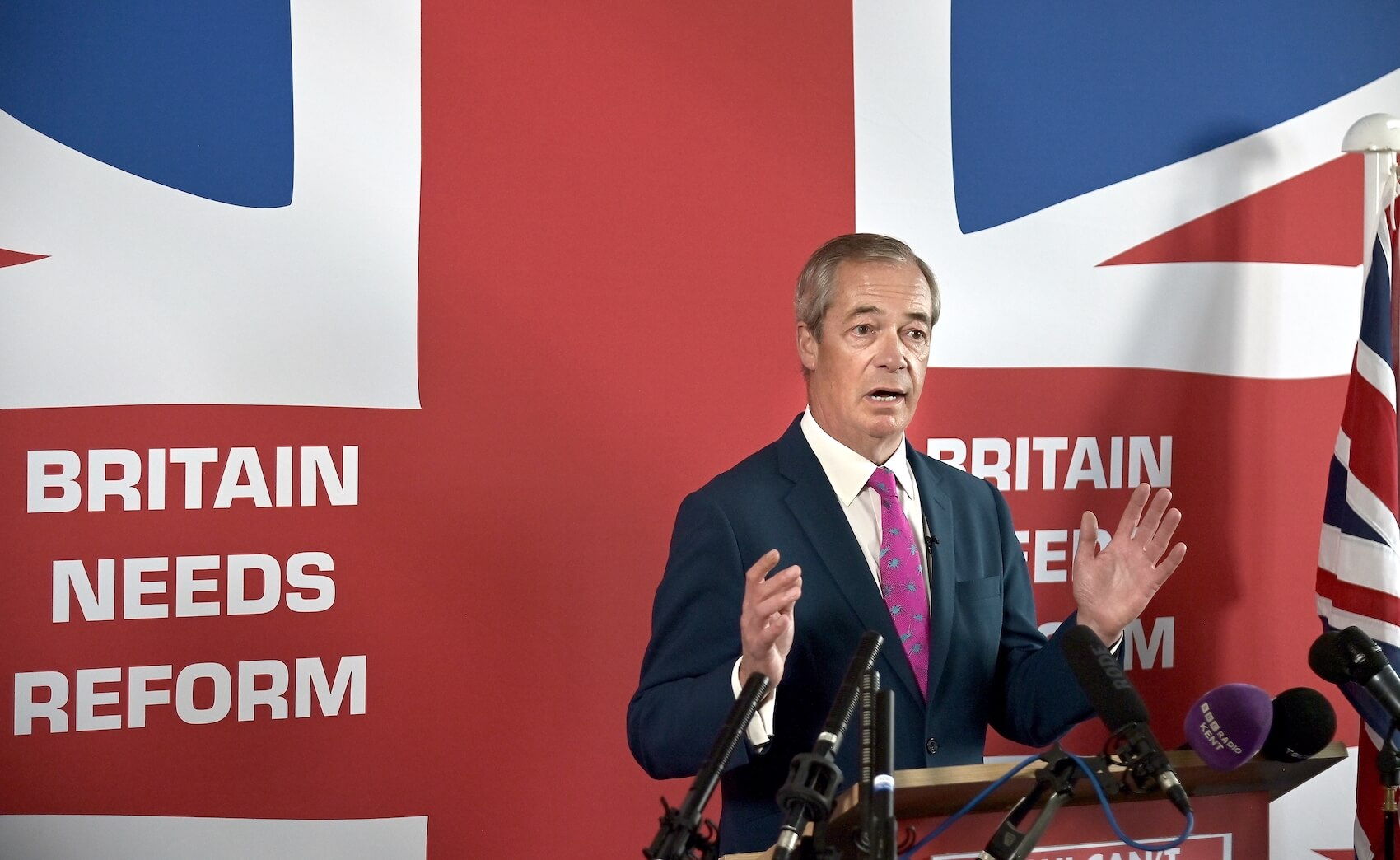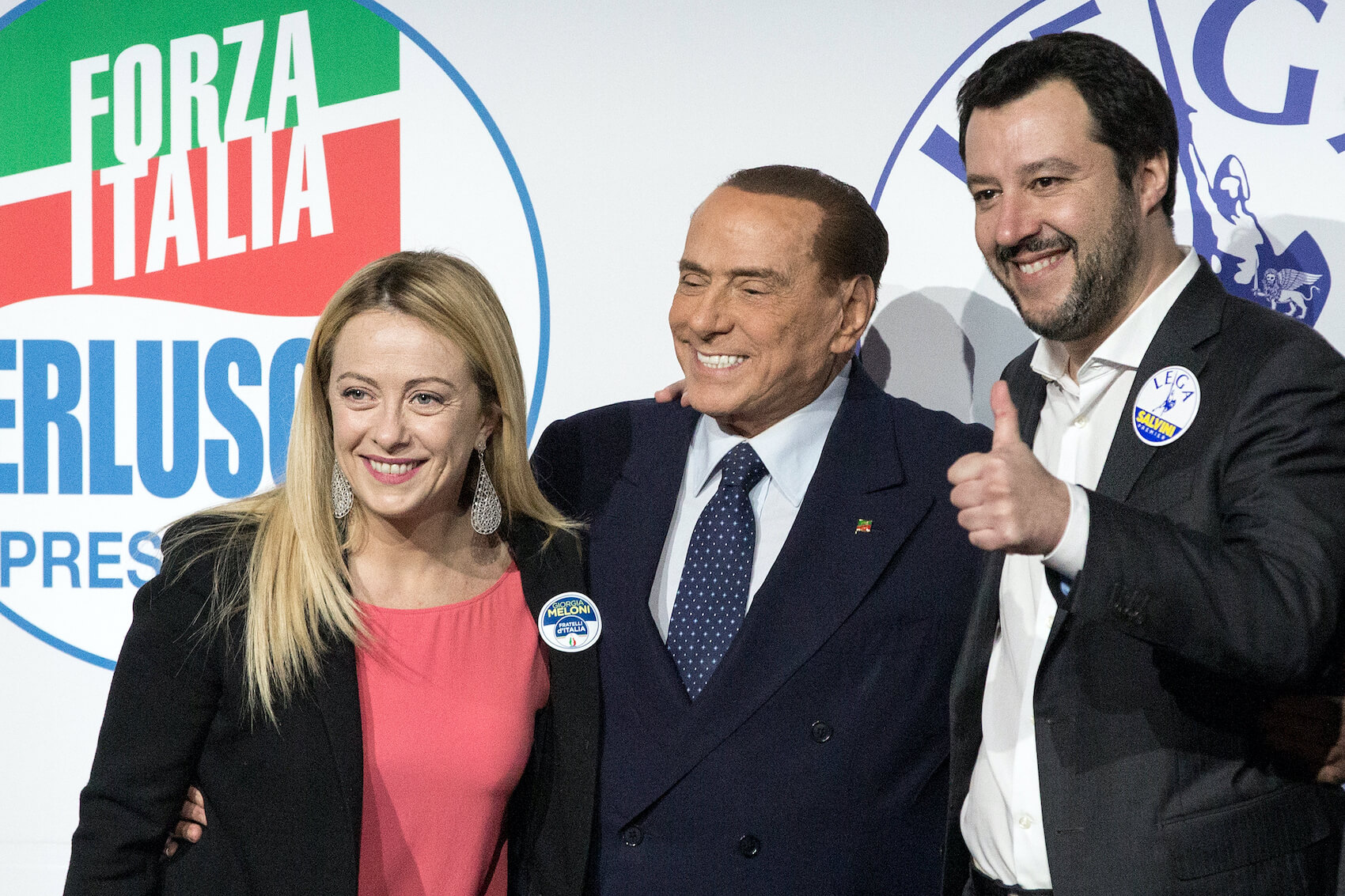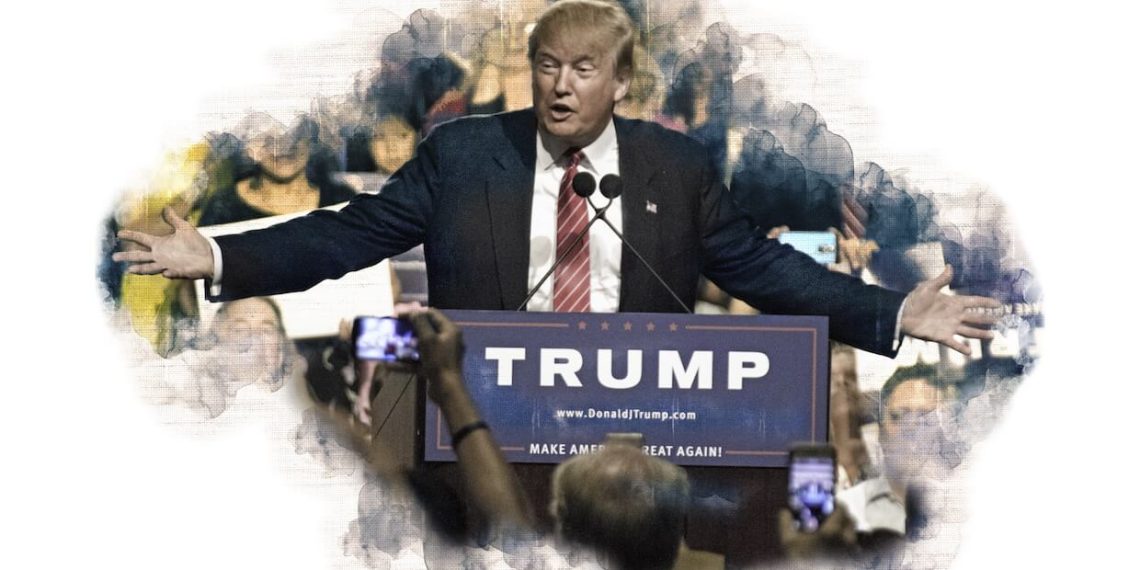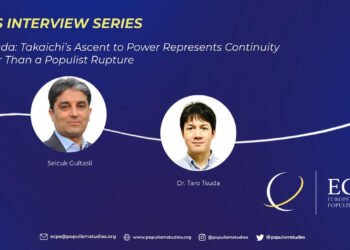On the 100th day of Trump’s second term, ECPS sat down with Dr. Robert Benson of the Center for American Progress to dissect the anatomy of democratic backsliding. In this wide-ranging interview, Dr. Benson warns of a “coordinated assault” on American civil society and urges a “coordinated defense” in response. Drawing comparisons with Turkey and Hungary, he highlights the early stages of authoritarian consolidation and calls for a “whole-of-society” mobilization. “We’re moving faster in the United States than the AKP ever moved in Turkey,” he cautions. From institutional capture to international instability, Dr. Benson’s insights are a timely wake-up call. “Authoritarians have coordinated,” he says—“now it’s time for democrats to do the same.”
Interview by Selcuk Gultasli
Marking the 100th day of Donald Trump’s second administration, the European Center for Populism Studies (ECPS) sat down with Dr. Robert Benson, Associate Director for National Security and International Policy at the Center for American Progress (CAP), to discuss one of the most urgent questions of our time: how democracies can defend themselves against coordinated authoritarian assaults. Drawing on comparative insights from Hungary, Turkey, and the United States, Dr. Benson offers a sobering but clarifying analysis of democratic backsliding and populist autocratization.
“This is truly a critical question,” Dr. Benson begins. “We must understand the timeline and scope of democratic backsliding.” While emphasizing the uniqueness of national contexts, he identifies recurring “red flags,” notably the failure of institutions and elites to respond decisively during what he calls the “early window”—the critical phase before authoritarians consolidate power. In the US case, Dr. Benson critiques what he calls a “politics of respectability” within the Democratic Party—an adherence to procedural norms long after the opposing party has abandoned them.
In an increasingly polarized and factionalized America, Dr. Benson warns of the systematic targeting of democratic institutions across civil society. Citing the German term Gleichschaltung—the 1930s strategy of coordinated authoritarian control—he stresses the need for a similarly coordinated democratic defense. “You target them all at once, and they fold,” he says of authoritarian strategy. “So how do we respond effectively? We need to build alliances… Business, universities, media—need to begin communicating with one another.”
Perhaps most striking is Dr. Benson’s comparison between institutional capture in Turkey and current trends in the US, where he argues the pace of democratic erosion is even faster. “We’re moving faster in the United States than the AKP ever moved in Turkey,” he warns. His call to action is clear: without “whole-of-society” mobilization that extends beyond coastal elites and engages Middle America, resistance risks fragmentation.
Dr. Benson does not limit his concern to domestic threats. He sees Trump’s foreign policy and suspension of military aid to Ukraine as emblematic of a broader unraveling of the post-1945 liberal order. “This is a complete victory for Vladimir Putin,” he states bluntly. From global alliances to civil liberties at home, the consequences are profound.
Yet amid the gravity of his analysis, Dr. Benson also sees opportunity—particularly in building transnational democratic networks. “Authoritarians have done a better job at coordinating,” he admits. “But that can change—if democratic actors start sharing tactics, intelligence, and, most importantly, a common purpose.”
The interview with Dr. Benson is a call to strategic clarity—and a coordinated democratic defense.

Here is the lightly edited transcript of the interview with Dr. Robert Benson.
Democracies Don’t Fall All at Once—They Fold, Institution by Institution, Unless We Resist in Time
Dr. Benson, thank you very much for joining our interview series. Let me start right away with the first question: To what extent do you see parallels between the initial public hesitation to resist Trump’s authoritarian tendencies in the US and the delayed resistance movements in Hungary, Turkey, and Serbia that you describe? How crucial is the timing of resistance in preventing democratic collapse?
Dr. Robert Benson: This is truly a critical question—understanding the timeline and scope of democratic backsliding. It’s important to acknowledge from the outset that the United States, Turkey, and Hungary are each unique cases. There isn’t a simple one-to-one comparison to be made between these systems, given their distinct political cultures, histories, and institutional frameworks. That said, there are certain common denominators—what I would call red flags—regarding how opposition forces respond during moments of constitutional peril. One recurring pattern is an initial hesitancy among those in positions of authority—within institutions—to take the threat seriously.
Let me begin with an American example. There has long been a belief—though I think that belief is starting to shift—that the Democratic Party, as the party of opposition, must adhere to a politics of respectability. That is, “we are not them,” and therefore we will stick to the rules of the game. This approach involves granting the ruling party the benefit of the doubt, even when it repeatedly disregards constitutional norms and even codified laws. This politics of respectability stems from a fundamental belief among many party members that they are still dealing with the Republican Party of 2012—or perhaps even 1995—not with a party that has been overtaken by a revolutionary political movement intent on dismantling the constitutional order. Because once you acknowledge the latter, your behavior must change. You don’t, for example—as the minority leader in the US Senate recently did—vote in favor of a Republican continuing resolution. In other words, you push back.
So why is it that we haven’t necessarily seen that kind of pushback? It stems from a moment of paralysis that often defines the early stages of democratic backsliding—when holding the governing party accountable can seem almost anti-democratic. There’s a reluctance to challenge those in power, a kind of political honeymoon period. But ironically, it’s during that very window that much of the most serious damage is done.
You emphasize the critical "early window" before authoritarians consolidate power. In the current U.S. context under Trump’s second administration, what institutional moves should civil society and opposition forces prioritize to prevent irreversible democratic backsliding? Based on recent U.S. protests, do you believe America is still within the "window of action"—or has it already started slipping into the harder phase of institutional capture?
Dr. Robert Benson: This is really a foundational question. There has to be an element of coordination when dealing with a coordinated attack on democratic institutions. The Germans have a word from the 1930s—originating from the era of state capture by the NSDAP—Gleichschaltung. It means coordination: getting business interests, civil society, universities to toe the government line and to yield to authority—all at once. You target them simultaneously, and they fold.
Now, I’m not making a direct comparison to the 1930s. I’m invoking the term more for what it offers in terms of definition. What we’re seeing today is a coordinated assault by the administration on all facets of American civil society—our universities, our civil service, the media, business interests—all happening at once. That’s intentional.
So how do we respond effectively? We need to build alliances. These individual, often atomized, components of our civil society—business, universities, media—need to begin communicating with one another. There must be an understanding that we need a broad democratic or republican front against this administration.
That’s why it’s so important, for example, for a university like Harvard, with a robust endowment, to stand firm and not capitulate to the administration’s demands. It creates a permission structure for others—whether in the media or private sector—to follow suit. That brings us to what I think is a fundamental law of democratic backsliding. And this idea isn’t mine—it comes from Tim Snyder, in his Twenty Lessons on Tyranny. His first lesson: Do not obey in advance.
Don’t give them what they want without even a fight. That’s exactly what was happening in the US at the beginning—with law firms like Skadden, for instance, capitulating before even receiving a list of demands. Or Columbia University, where the dominoes were falling quickly. The administration settled cases with ABC after the George Stephanopoulos interview, and there was another with CBS after an interview with Kamala Harris that Trump didn’t like.
But now we’re beginning to see a shift. There’s growing resistance to this impulse to obey in advance—and that is, I think, a reassuring sign.
We Only Have Ourselves: Resistance Must Come from Middle America
You noted the critical importance of institutional pushback. Given that some US institutions themselves — like parts of the judiciary or state legislatures — are increasingly aligned with authoritarian currents, how can civil society realistically force institutional resistance when traditional checks and balances are already compromised?
Dr. Robert Benson: The European Union and the United States are obviously two very different systems with two very different capacities for democratic resilience. The European Union has vastly different tools at its disposal compared to the United States.
Take, for example, Article 7 and the withholding of funds. In the Hungarian case, this has been a potent political cudgel that the EU can use to compel rule-of-law behavior. In the US, by contrast, there is no supranational authority that can hold this administration — or even the American courts — accountable for how they comport themselves. We only really have ourselves.
And by the time we reach the point of institutional capture, a lot of damage has already been done. Trump had four years in which to pack the judiciary. And he did — in a manner very reminiscent of what PiS, the Law and Justice party, did in Poland. And when I say similar, I mean strikingly similar. Withholding Merrick Garland’s nomination for 293 days and then ramming through his own nominee, using every tool at the majority’s disposal to pack not just the Supreme Court but also the lower courts.
As a result, about a third of the American judiciary now consists of Trump appointees. That’s a staggering figure — and, depending on your perspective, one of the great “successes” of his administration.
So, lacking any kind of supranational oversight like the EU, the US is left with its domestic institutions — and the most important ones, like the courts, have already been compromised.
Then you move to the legislature, to Congress. This is where it gets even trickier. The US political system has an internal mechanism that enforces party discipline — the primary system. Republicans are afraid to stand up to MAGAism because they face acute primary challenges from the right.
And here’s the really difficult part about democratic backsliding and autocratization: sometimes, especially in the initial phase, it can be popular. Trump won the popular vote. He won all seven swing states. He has a tight grip on one of our two major political parties. Until that grip is broken — and I mean broken from the bottom up, not by pressure from Washington, D.C., or New York or Los Angeles, but from places like Ohio and Middle America — we’re not going to see Congress behaving differently. Because doing so won’t be in their political interest.
In your analysis of European and Turkish cases, mass mobilization alone was often insufficient without elite defections. In today’s US context, do you see any meaningful elite-level breakaways that could help halt Trump’s authoritarian drift — or is elite resistance still too fragmented? What specific lessons can American opposition leaders learn from these cases to build more effective alliances against creeping authoritarianism?
Dr. Robert Benson: Turkey is a fascinating case — and a complex one. You have the AKP effectively in power for over 20 years, with a steady and systematic capture of institutions. As I mentioned in the op-ed, this culminated in the arrest of the mayor of Istanbul, arguably Erdogan’s most formidable challenger in a potential presidential election. Let’s not forget that Erdogan succeeded in changing the Turkish constitution to further consolidate power, shifting the system toward a fully presidential model.
What’s remarkable — and alarming — is that when comparing the Turkish and American cases directly, we’re moving faster in the United States than the AKP ever did in Turkey. That’s startling, but it’s true. And if you consider the damage done in Turkey over that timeline and extrapolate the same arc onto the US, factoring in the potential for at least three and a half more years of Trump — and possibly more, if constitutional meddling occurs, which is not unthinkable given the Republican Party’s trajectory — then the damage here could be decisive. Decisive in the sense of being existential for the Republic.
To return more directly to your question: Why is it that some cases of mass mobilization succeed while others don’t? Mass mobilization has to have a clear, unified aim. Take the Slovak case in 2018, following the assassination of a prominent investigative journalist. That led to a whole-of-society mobilization. And I emphasize that term — whole-of-society. That means unity between labor movements, students, public intellectuals, and crucially, ordinary people who may not identify as political at all. Historically, dissent tends to be concentrated in elite or intellectual circles — in Turkey, for instance, in large cities along the Mediterranean coast or like Istanbul or Izmir.
But if resistance remains confined to these enclaves, it remains too narrow to shift national trajectories. You have to expand the aperture. In the US, this means the opposition to Trump cannot be concentrated just on the coasts, nor can it come solely from universities or the educated elite. It has to emerge from Middle America. That’s when real political challenges begin to register.
The Romanian case against attempts to weaken anti-corruption laws is another example. Protests weren’t limited to Bucharest — they were widespread across cities like Timișoara and Cluj. That geographic spread was essential in forcing parliamentary actors to defect, to break with the government’s agenda and block the legislation. That’s the kind of pressure that needs to be replicated in the American case — to force elite-level defections. In this context, defecting means breaking with President Trump and his agenda.
Cultural and Economic Dislocation Is the Authoritarians’ Playground

You describe how conspiracy theories and economic neglect fueled authoritarianism in both the US and Europe. Beyond restoring institutional trust, what societal interventions — if any — do you believe are most critical to reversing the cultural dislocation exploited by the new authoritarians?
Dr. Robert Benson: The question of the genesis of these political movements — how they came to be — is still being debated in the social sciences. This is very much a live debate. By and large, you can summarize the competing perspectives along two poles: culture and economy. I think it’s probably a bit of both.
What do I mean by culture and economy? On the economic side, it’s the classic tale of globalization gone wrong. You have a globalized economy from the late 1990s into the 2000s that resulted in a hollowing out of the middle class across industrial societies — principally in the United States. Think of the American Rust Belt: the industrial heartland losing manufacturing jobs. But also look at Europe. Take the United Kingdom, particularly the North and Northeast.
If you continue to follow the economic thesis, it suggests people experienced a depreciating standard of living. They felt left behind by a political establishment that was inattentive to their concerns — and they began voting for the extremes. Then came the hucksters and charlatans — the Nigel Farages, the Brexiteers, or in the American case, Trump — who said, “I understand your pain. I get it. You’ve been screwed over by a political elite that doesn’t understand how hard it is to get by day to day.”
Then comes the pitch: setting Middle America — or the working-class communities of the Red Wall in the UK — against the elites in London or the elites in Washington and New York. And this is where the cultural element comes in. It’s not only that you’ve been economically neglected and cast aside by this mad embrace of globalization, whatever that means — but on top of that, you’ve been alienated culturally.
There are no cinemas in your town. No one tours there. There are no concerts, no communal activities. No opportunities for you to engage in public debate. You’re isolated. You’re economically disadvantaged. And you don’t share in — not just the national wealth — but the cultural wealth that society produces. And that makes people really mad.
So, it’s the combination of economic and cultural dislocation. The opportunity structures that exist within these two pillars gave us populism as a political phenomenon. But more specifically, authoritarian populism. Because populism on its own isn’t enough. It has to become authoritarian — in the sense that there’s only one solution: our solution. Democracy itself, they argue, has failed us. Therefore, we must look beyond democratic remedies.
The Hegemon Has Withdrawn—Now Comes the Disorder
You argue that Trump’s America First policy has undermined global stability and encouraged aggression. How much damage to the international liberal order is now irreversible, and where should democratic states prioritize defense and rebuilding efforts?
Dr. Robert Benson: If we’re moving from a domestic analysis—looking internally at our societies and what gave rise to authoritarian populism—to the international level, we see that authoritarian populism is highly destructive. It’s destructive because it fundamentally does not believe in cooperation.
The international order that the United States principally helped establish after 1945 was built on cooperation. Some would argue that this order was defined by American hegemony. But that hegemony, for all its flaws, created the conditions for global cooperation.
So, what happens when the hegemon withdraws? That is precisely what’s occurring now. The US is retreating from the international domain. We’re witnessing a descent into multipolarity—and potentially into regional or factional rivalries. This is dangerous for a number of reasons. It introduces a profound element of uncertainty.
In this new world of geopolitical competition, what is to stop an autocrat like Vladimir Putin from not only invading Ukraine but also extending aggression toward the Baltic States? What is to stop Xi Jinping in China from pursuing territorial ambitions in Taiwan?
More to the point—if we consider the realm of political economy—what is to stop nations from retreating entirely into protectionism and national isolationism, shielding their domestic industries to the detriment of their peers and neighbors?
Some might even attempt to annex foreign resources, as we’ve seen hints of US policies toward Ukraine’s critical minerals—or potentially even ambitions involving Canada or Greenland. This marks a retreat from the rules-based international order the US helped to forge after World War II, while simultaneously becoming the principal antagonist to that very order.
How has Donald Trump’s suspension of military aid to Ukraine reshaped not only the war’s dynamics but also the global perception of America’s commitment to democracy and international alliances? Can this policy shift be seen as a strategic victory for authoritarian regimes like Russia’s?
Dr. Robert Benson: Well, we can begin with the latter part of the question. I mean, certainly this is a victory for Russia. It’s a complete victory for Vladimir Putin—he could not have wished for a better outcome. From the beginning, Putin claimed that he didn’t have to win in Ukraine; he just had to wait out the Americans and the West, who he believed would grow tired and fickle in their commitment. And that’s exactly what has happened.
There’s a prevailing attitude among segments of the American public that Ukraine is a boondoggle. Take, for example, the hurricane that hit Asheville, North Carolina, last year and caused extensive damage to an economically deprived region. Trump and his allies on Fox News were able to exploit that moment by drawing a stark comparison: all this money—$60 billion in supplemental aid—is going to Ukraine, while Americans at home receive next to nothing. FEMA famously issued a check for about $750, and the narrative quickly became: $750 for you, even though you lost your home, but $60 billion for Ukraine. Now, that’s a misleading comparison—$750 was just an initial payout—but the narrative stuck. And it was highly effective. This is where Trumpism and MAGAism connect the domestic with the international. But what does this mean for the American-led alliance? At best, it means that alliance is destabilized. At worst, it means it has failed—that it’s over.
The new German Chancellor, Friedrich Merz, on election night, said that Europe has to begin preparing for independence from the United States. He actually said this. The Americans have managed to turn the Germans into the French when it comes to strategic autonomy. That’s truly remarkable. There isn’t a more staunchly Atlanticist political culture than Berlin’s, yet there’s now a growing realization in Europe that the United States cannot be counted on.
Even if the Americans come back in 2028 with a new Democratic president and say, “We’re back,” who’s going to believe them? US politics have become so polarized and unpredictable—veering from one extreme to the other—that even that kind of return won’t restore trust.
Frankly, I’m skeptical that a Democrat will win the White House in 2028. The long-term trends point toward a consolidation of MAGA-style Republicanism. So, what do our European partners do in the meantime? They need to prepare for a post–Pax Americana—a world where the United States is no longer the hegemon, where its network of alliances no longer provides a reliable security guarantee. And they need to do this as quickly as possible.
The Far Right Coordinates Better Than Progressives—But Cracks Are Emerging

How do you see the growing alliance between the American and European far right — as highlighted at events like CPAC (Conservative Political Action Conference) — accelerating global disorder? How significant is this transatlantic connection for democratic resilience in both Europe and the United States, and how seriously should mainstream democratic actors take this emerging cross-border coordination? What counterstrategies do you recommend to disrupt this movement before it becomes too entrenched, and is there still a realistic path to reverse its momentum?
Dr. Robert Benson: There’s something ironic—almost bizarre—about the fact that hyper-nationalists and authoritarian nationalists are, in many ways, more effectively internationalizing their political movements than progressives. Intuitively, one would assume that it’s in the DNA of liberal and progressive political parties to coordinate across borders more easily than nationalists, whose worldview is, by definition, insular. But the opposite has happened. The far right—and the authoritarians—have done a much better job at coordinating. This has serious implications. They are learning from one another. There’s a phenomenon called “autocratic learning,” where figures like Viktor Orbán realize that if they replace civil servants with party loyalists, they can more effectively control the machinery of government. Donald Trump observes this, communicates with Fidesz advisors, partners with the Heritage Foundation, and suddenly we see efforts to purge the civil service in Washington, D.C.
This is incredibly concerning—not only are they learning from one another in the abstract, but they are actively communicating, including at venues like CPAC. That said, I would qualify this by noting something interesting is happening. Because nationalists are inherently insular, there is always the risk of rupture in their alliances. And I think we may now be witnessing such a rupture. Look, for example, at how Marine Le Pen has responded to trade war rhetoric—she’s taken a very anti-American, or at least anti-American-administration, stance. AfD leaders like Alice Weidel have openly stated that German national interests are antithetical to those of the United States. So, embedded in these movements is a core belief in national self-interest that makes sustained international coordination inherently fragile. It’s only a matter of time before these tensions come to the fore.
Interestingly, what we’re now seeing—contrary to my earlier expectations—is that Trump may actually be catalyzing division within the European far right. These actors are distancing themselves, saying, “We didn’t sign up for this. We’re not in favor of the trade war. We don’t want to hurt rural workers in France or Germany.” This distancing is notable and worth watching. So, there’s nuance here. While the transatlantic authoritarian alliance is real and dangerous, it may not be as stable or unified as it initially appeared.
You describe the far right’s globalization as a new, coordinated movement. In practical terms, do you see any emerging counter-globalization among pro-democracy forces, or is the liberal democratic camp still acting mostly in isolated national silos?
Dr. Robert Benson: I think this follows nicely from the conversation we were just having. Yes, I do think the far right—and the authoritarian right—has done a better job of coordinating in recent years. There are, as I’ve discussed, vulnerabilities to that coordination.
So how do progressive, pro-democracy forces respond? They respond, first and foremost, by talking to each other. The Democratic Party in the United States has to be in contact not only with the Liberal Party in the United Kingdom and the Social Democrats in Germany—in terms of their common ideological alignment—but, quite frankly, with all parties that believe in the rule of law and democracy.
In particular, I think it would behoove the Americans to start talking to parties that have actually experienced societal democratic backsliding. Talk to the CHP in Turkey. Talk to the Serbian opposition. Talk to Elly Schlein’s PD in Italy, which is contending with Meloni. It’s important that we move beyond viewing the world strictly through the lens of left-to-left or right-to-right dialogues. Instead, we should begin thinking in terms of: who believes in democracy and preserving constitutional order—and who doesn’t? That’s the fundamental question of our time. And then we need to coordinate accordingly with those who share democratic commitments, sharing information, tactics, and messaging on how to effectively push back against incumbent authoritarian threats within our own societies.
Don’t Just Defend Democracy—Explain Why It Matters to Daily Life

Drawing from the examples of Turkey and Hungary that you cited, once authoritarian populists consolidate institutions, reversal becomes nearly impossible. What lessons should US opposition parties urgently learn from these cases to avoid repeating the same mistakes?
Dr. Robert Benson: There seems to be an emerging consensus that talking about democracy alone is probably insufficient. A colleague once told me, "I can’t eat the rule of law. It doesn’t put food on my table. It doesn’t pay for my prescription drugs." And it may potentially ring hollow when a hyper-educated and cultural elite from Washington, D.C., or any of these national capitals, talks about the rule of law—about democracy—as these kind of abstract concepts that you can’t really concretize.
Maybe we have to do the important intellectual work of connecting these concepts—these abstract notions—to real-world things. What I mean by that is: it’s not just that losing the rule of law is dangerous in itself (which it is), but that it creates permission structures for corruption. Your quality of life is materially worse off when you cannot rely on the state to do what it’s supposed to do—and to do so honorably. So talk about that. Talk about how democratic backsliding undermines public healthcare—how it renders it ineffective—or how it takes away from public education, how it creates different strata of access based on who has connections, based on who can pay and who cannot.
Make it very clear that it’s not just a defense of these concepts in themselves that warrants our attention, but how these concepts intersect and feed into our lived experiences as citizens—of a collective, of a community. Because if we can do that—and do it successfully—we bring so many more people into our camp. So it is a challenge for those who believe in the rule of law, who believe in democracy, not simply to stop there, but to take it one extra step—and just tell us why it matters: to my life, and to the life of my children and my family. Because I think that is the only way we create a robust, whole-of-society resistance.
And lastly, Dr. Benson, reflecting on your comparison of today’s political climate with the pre-WWII appeasement of Nazi Germany, what lessons should US and European leaders draw right now to avoid repeating historical failures, especially when facing coordinated disinformation and populist-authoritarian challenges?
Dr. Robert Benson: History doesn’t repeat itself. I mean, the famous line is that history repeats itself, but actually, it more accurately rhymes. I don’t think we’re living through some kind of redux of the 1930s. Having said that, that doesn’t mean there aren’t lessons we can derive from the breakup of Czechoslovakia. Kaja Kallas-EU High Representative-famously said that this is 1938 and that we need to act accordingly. I’m not so sure it’s 1938—that would imply the response would have to be complete victory over Russia, the seizing of Moscow. I mean, that’s not where we are. Let’s be honest about where we are. We have echoes of the 1930s in our politics. So I think that means we have to take seriously threats both domestically to our democracies, but also to an international order that is under pressure.
The more appropriate comparison in my mind than the 1930s would actually most likely be the pre-World War I period, where you had incredible inequalities within societies and also between states. You had, for the first time, a truly globalized economy that had undergone an economic shock. And then you had the seemingly unstoppable spiral toward catastrophe—towards a global war. I think these dynamics are the ones that most concern me, and these are the dynamics I think were prevalent in the early 20th century, in the lead-up to the First World War. So I’m not so sure about the utility of making the 1930s comparison per se. But I do think, insofar as it serves as a wake-up call, it’s important for us to realize there’s work to be done.


